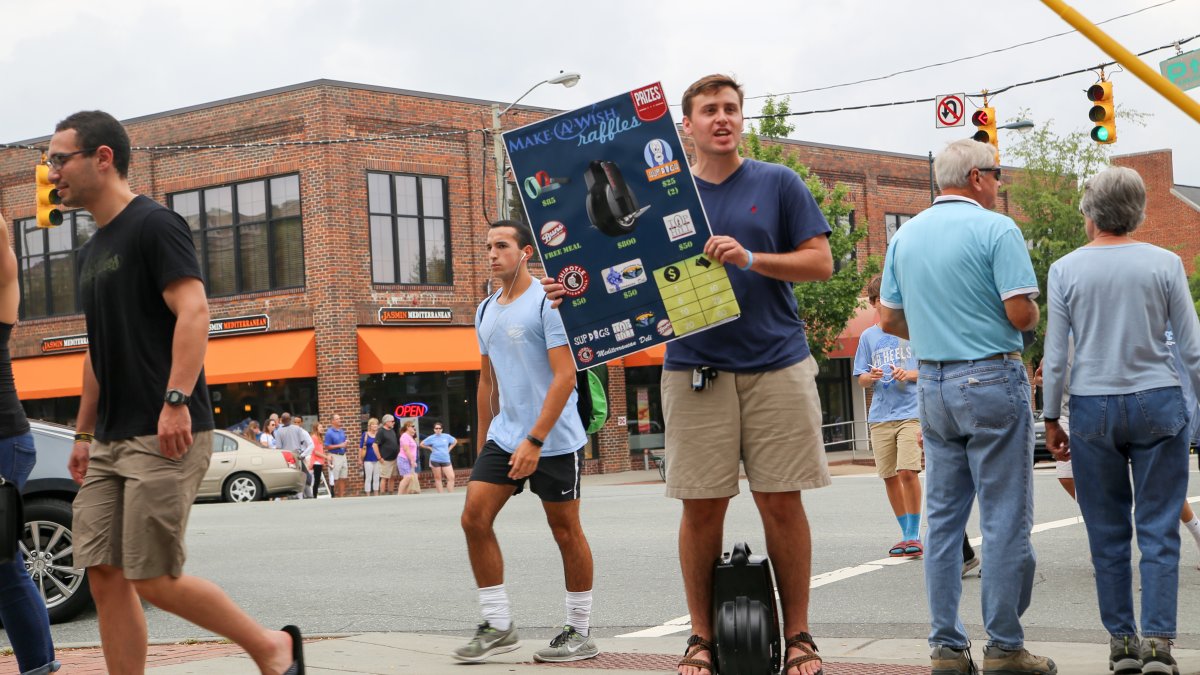Carolina students hit the market for a cause
Entrepreneur-In-Residence Jim Kitchen uses a unique project to teach his students the core principles of entrepreneurship.

Sam Henderson likes plans. But when tasked with creating a profit-making business in less than two weeks, a complete model quickly went out the window.
“I like having things structured, and entrepreneurship is definitely not that,” the senior business student said. “You need a plan for sure, but you also need to be willing to be flexible.”
With more than just personal profit on line, Henderson found himself standing on Polk Place on Saturday afternoon handing out bottles of water, figuring out his market on the fly — all to send a 12-year-old to Walt Disney World.
Henderson was among the 90 groups of Carolina students from Kenan–Flagler Business School’s Entrepreneurial Studies course and the GLOBE Program who took what they’ve learned in the classroom to the streets to turn a quick profit for a cause.
Money raised will go toward helping purchase cars for members of the Community Empowerment Fund and sending a young boy with Cystic Fibrosis to Disney World with his family through the Make-A-Wish Foundation.
From selling T-shirts on Franklin Street to glow sticks outside Kenan Stadium, the students spread throughout the Triangle area to sell their products. They ultimately raised more than $35,000 for local charities.
“It’s really about launching and learning — learning from what they’re doing,” said Jim Kitchen, Entrepreneur-in-Residence at the Kenan-Flagler Business School and professor of Entrepreneurial Studies. “Yes, this is an academic exercise, but learning that profit in the right context is the point.”
Kitchen started the “Ready, Fire, Aim” project four years ago to teach the core principles of entrepreneurship.
“I can lecture them, I can have them read a book about entrepreneurship, but there’s really no substitution for actually doing it themselves,” he said.
At the start of the project, each student is given $50 in seed money. Then, in pairs, they developed a product that they must turn around and sell to create the most profit possible in a week.
Senior business student Mitch DeForest, who raised $2,442 by selling T-shirts, said the project is unlike anything he had done in previous classes.
“This is very real world,” he said. “In some of the other classes we had a little mini project, but nothing where the teacher walks in, gives you $100 in seed money and says ‘Go make as much profit as you can.’”
The exercise helps the students to avoid the common pitfall of starting a business — taking too long to start by over planning — by forcing a quick execution. Students had a week to plan and execute the business before the end of the project.
“A lot of times what happens is somebody launches a startup and they’ll obsess about the company’s name, their website, and they’ll spend weeks, months, or years actually getting their product in front of customers,” Kitchen said. “With this project students are forced to go through ideation, validation and execution in days.”
That lesson wasn’t lost on the plethora of Carolina students flooding Franklin Street and Stadium Drive ahead of the Tar Heels’ home football opener.
“You have to get out there and do it,” DeForest said. “With something like this there’s no time to sit around and sweat the small details. We spent a lot of time designing the shirt, but it was like ‘We have to get this going today because we have to start selling tomorrow.’ We really had to condense everything and go for it. Dive straight in. Aim last and fire right away.”
Outside of learning to launch a start up, students also faced everyday business problems.
With 175 students spread in a close area, the marketplace became highly competitive. For Henderson, that meant moving from place to place trying to stay away from his competitors.
“With 65 teams selling similar products, the market can get congested quickly,” Kitchen added. “It’s a real simulation. It’s a tough exercise.”
But Kitchen didn’t want the students to just get lost in the profit margin. He wanted them to have a purpose for what they were doing.
That purpose came in the form of Aiden, who is being treated for Cystic Fibrosis at UNC Hospitals. Instead of going into their own pockets, some of the students’ profits will send Aiden and his family to Disney World. The rest will be dedicated to providing reliable transportation for some individuals who are on the brink of homelessness in Chapel Hill.
“It’s OK to build a big house or have a fancy car, but there’s much more to life than that,” Kitchen said. “Their brand in this project was Make-A-Wish and the Community Empowerment Fund. Learning that making a profit for a purpose is a lifelong lesson. It’s bigger than them. It’s bigger than just ‘revenues exceeding expenses.’”




